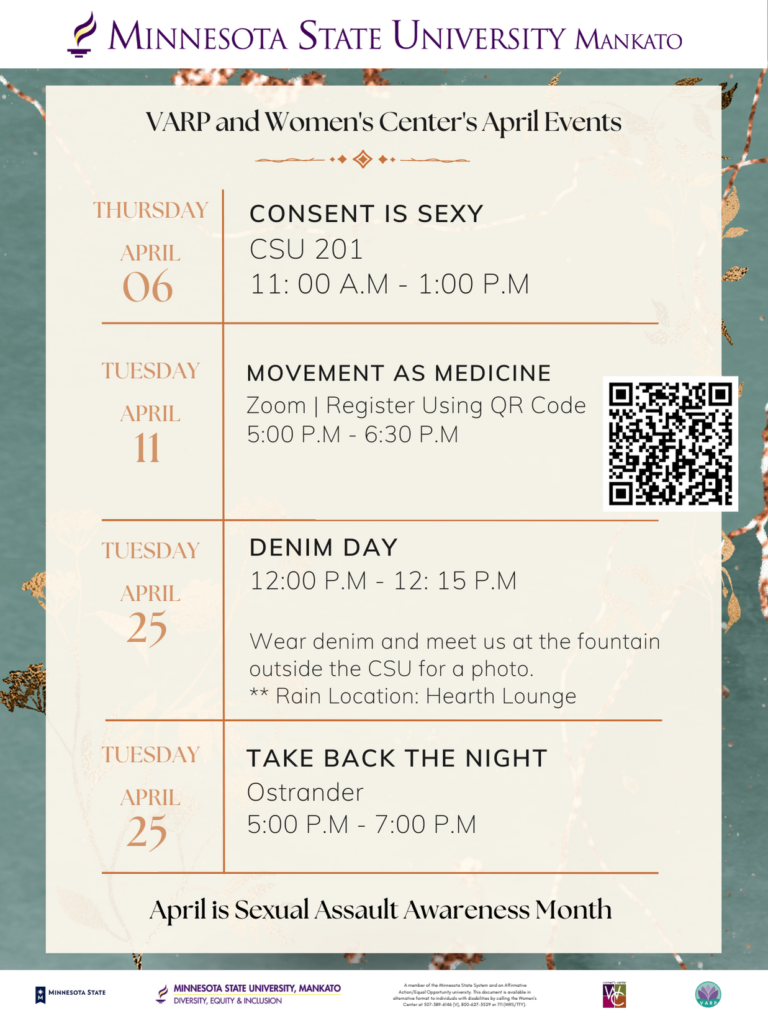If you or someone you know has experienced sexual assault, know that you are not alone.
By ANNELISE MILLER, CSU Student Staff Writer
According to rainn.org, the nation’s largest anti-sexual violence organization, 13 percent of all students experience rape or sexual assault through physical force, violence, or incapacitation.
With more than 14,000 students here are Minnesota State Mankato, that suggests nearly 1820 students could experience sexual assault. We know it is a problem. We have seen the orange flyers, gotten the emails, but likely just disregarded them and went on with our day. In honor of Sexual Assault Awareness Month during April, we continue the conversation.
Campus Sexual Assault
“There is an epidemic on our campuses. Nearly 1 in 5 or 1 in 4 undergraduate women experience sexual assault while they are a student,” says Liz Steinborn-Gourley, Women’s Center Director and Maverick Diversity Institute Coordinator.
Based on statistics, Steinborn-Gourley says that the highest risk of sexual assault is during the first six weeks of the semester. Contrary to the narrative that all men are suspects, often these incidents involve a few predators who have multiple victims.
She references the film, The Undetected Rapist by David Lisak, a University of Massachusetts-Boston expert on campus sexual assault.
“The vast majority of rapes are perpetrated by serial offenders who, on average, have six victims. So, this is who’s doing it,” Lisak states.
One thing that Steinborn-Gourley emphasizes is that it is never the victim’s fault.
“You could be buck naked laying in the middle of the residence hall, but there is absolutely nothing that makes it acceptable for a sexual crime to happen,” she says.
The root of this lies in consent. We have all heard “yes means yes” or “no means no” at some point. The topic of consent is also a huge tie to sexual assault awareness. Consent can be withdrawn at any time, and everyone needs to be aware of and respect that.
“I think there is an enormous lack of understanding of consent in our culture,” says Steinborn-Gourley. She believes this comes from how sex is a taboo topic in our culture.
‘I think one of the best ways is for more people to talk about it.’
Liz Steinborn-Gourley
According to Mai Ker (MK) Thao, the Violence Awareness and Response Program (VARP) graduate assistant, educating the entire campus community is key to awareness and prevention.
“I think it is important to shed light on sexual assault as a university, because there is still a large majority who misunderstand what sexual assault is and means. It is much more than just rape and vaginal penetration,” Thao says. “Sexual assault is a form of violence that involves forced or unwanted sexual activity. It can take many forms, including rape, molestation, unwanted touching, and exposure to sexual materials.”
Thao cites, multiple occasions, where students were unaware that sexual assault was still possible even in an already-established relationship.
“Many do not think sexual assault concerns them because they think sexual assault occurs between a male preparator and female victim” Thoa says, “Sexual assault can happen to anyone, regardless of age, gender, or sexual orientation,” says Thao.
She states that it is important to continuously shed light on sexual assault on campus, and to continue to educate students.
“When you look at our numbers, it’s not even close to one-fifth of students, because most students don’t report due to a ton of different circumstances.”
Liz Steinborn-Gourley
Reporting
April is a good time to educate yourself during Sexual Assault Awareness Month.
“The more we talk about sexual assault awareness month, the more people will feel like there is an opportunity for people to come forward,” Steinborn-Gourley says.
Through awareness, students feel more comfortable and inspired to come forward. Some victims, however, may never feel comfortable enough to report the incident.
“When you look at our numbers, it’s not even close to one-fifth of students, because most students don’t report due to a ton of different circumstances.”
Steinborn-Gourley shares ways to report. One way is by going into the Women’s Center, CSU 218, where Steinborn-Gourley works. “When a student comes in and says ‘hey I think something has happened.’ We go through: ‘are you safe right now?’ ‘What do you need to get to a place where you at least feel physically secure’.” Steinborn-Gourley says.
One thing to note is that almost all staff are mandated reporters. If you talk to them, they are obligated by policy to notify campus security, which will trigger a report. This includes CA’s, Steinborn-Gourley, professors – any university employee.
Once reported, the Office of Equal Opportunity and Title IX gets involved. The office will reach out via email to invite you to come in to discuss the incident.
The place where reports happen is the Office of Equal Opportunity and Title IX. Services provided through Title IX, include, but are not limited to, investigating allegations of harassment or discriminated against an individual due to protected class status, or impacted by sexual violence. Education and training regarding those topics is also provided.
Victims can choose to fill out a report online, without having to initially speak with them. You have the option to fill this out anonymously by opting out of certain information, however you then will not be able to receive any follow-up.
If you choose to fill out the report with the full information, Minnesota State Mankato is required to investigate allegations of sexual and gender-based misconduct. The University will follow up on any specific, identifying information provided in this report. They can help file a report with law enforcement if the student wants – a report to Title IX does not automatically trigger a report to law enforcement.
At any point in the process the victim can withdraw their participation in an investigation.
Students can also choose to go in person for walk-ins, or can make appointments.
Students who do not want a report can comfortably go to the Counseling Center or Health Services. They are not mandatory reporters. Another option is the Committee Against Domestic Abuse (CADA).
CADA
CADA, also known as the Committee Against Domestic Abuse, located very close to campus, offers a 24-hour crisis line, is under no obligation to report to the university, and offers confidential advocacy.
A CADA advocate can meet you at a hospital, house, or anywhere you feel comfortable. They can go through both the legal processes and emotional aspect of healing and care with someone who understands sexual violence.
CADA’s regular business hours are Monday through Friday from 8:00 a.m. to 4:00 p.m. You can call their 24-hour helpline at 1-800-477-0466. To text with an advocate, text 507-223-4200. Advocates can also be reached via email at advocacy@cadamn.org.
If security is called to respond to a sexual assault report, they will call CADA, then leave the room when the advocate comes, so students don’t feel pressured with security watching and taking notes.
You can learn more on the CADA website.
‘There is, of course, more that we could do.’
Liz Steinborn-Gourley
Campus Efforts
The Women’s Center offers both a safe space, and advocates for students and victims.
“[The Women’s Center] will always welcome students in – we can have hypothetical conversations, you can come ask questions for a friend, talk about your own experience, anything you need,” says Steinborn-Gourley.
She also notes that, as part of the Minn State system, staff and faculty are required to complete sexual harassment and assault training every year. Residential life also does a large training for their student staff. Students are also required to complete a sexual assault training via D2L upon enrollment. She understands that such training can feel awkward, but thinks that every bit of education helps.
“I think any opportunity to require students, to even just (for) a moment, think about sexual violence or where they can get support or what is consent, is good.”
Steinborn-Gourley says ongoing services are offered throughout the year with heightened focus during April.
“There’s, of course, more that we could do,” she says, “but we bring in educators, we observe Sexual Assault and Domestic Violence Awareness Month as a way to bring more light to the topic.”
‘I noticed that there was a lack of culturally specific resources.’
Mai Ker (MK) Thao
Cultural-Specific Support
Thao said a topic often left out of the conversation is dealing with assault with a cultural lens.
“When I first started my position in August 2021, I noticed that there was a lack of culturally specific resources. I guess much of my sentiment and thoughts came from me having come from an ethnic background,” she says. “As a Hmong person, I have always felt a disconnect in my education, and the resources offered to me. I often felt like those who were helping did not understand me from a cultural perspective.”
Thao knew that her feelings and experiences were not unique. She wanted to collect a list of resources that worked with specific groups. One of the first tasks that she assigned herself was to reach out to different organizations and compile a list of culturally specific resources, says Thao.
The list is available at the end of the story.
Conclusion
Sexual assault is an issue prevalent across campuses worldwide. While it can be an uncomfortable topic, there is no change without education and awareness. Take time this Sexual Assault Awareness month to learn something new, and reach out for help if you need.
Culturally-specific Resources
Asian Women United of MN (AWUM)
Crisis Line 612-724-8823
Crisis Line 651-772-1611
Communications Services for the Deaf MN Domestic Violence Program
651-487-8865
612-822-0127
651-222-5836
Upper Midwest American Indian Center
612-522-4436
Brian Coyle Somali Program
612-338-5282
Minnesota Indian Women’s Resource Center
612-728-2000
Refugee and Immigrant Counseling Services : Pathways Counseling Center, Inc
651-641-1555
Mental Health Service 612-616-9189
Resources on campus
VARP – CSU 218
(507) 389-5127
The Violence Awareness and Response Program offers confidential advocacy, programming and education for victims/survivors of relationship abuse and sexual violence.
Student Health Services – 21 Carkoski Commons
(507) 389-6276
Student Health Services is open for in-person and virtual telehealth appointments. We offer an accredited on-site medical clinic with a full-service pharmacy, lab services and health education.
Counseling Center – CSU 285
(507) 389-1455
The Counseling Center provides a range of mental health services, from individual and group counseling to referrals. Services are free, comfortable, and confidential; the Counseling Center is here to help students navigate any difficulties going on personally, socially, or in school.
Residential Life – 111 Carkoski Commons
(507) 389-1011
Strives to provide convenient living spaces, intentional services, and actively engaged staff to help all students build connections, get involved, and achieve success as a Maverick.
Equal Opportunity & Title IX – Morris Hall 014
(507) 389-2986
Minnesota State Mankato is committed to providing access, equal education and employment opportunities to all persons, and does not discriminate on the basis of race, sex, color, creed, age, national origin, disability, marital status, status with regard to public assistance, sexual orientation, gender identity, gender expression, or any other group or class in which discrimination is prohibited by federal or state law.
MNSU Security – Wiecking Center 222
(507) 389-2111
University Security advances the mission of Minnesota State University, Mankato by maintaining a safe and secure living, learning and working environment in partnership with the community we serve.
Tips to support a survivor
Thao offers the following tips to support a survivor:
Avoid judgements
Offer support
If they seek medical attention or plan to report, offer to be there
Be patient
Avoid putting pressure on them to talk about something they are not ready to do yet
Check in periodically
Remind them you care about them and believe them
2023 Sexual Assault Awareness Month events:

If you or someone you know have experienced sexual assault, know that you are not alone.

